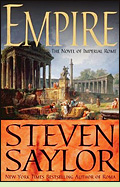|
Empireby Steven SaylorReviewed by Margaret Donsbach
After Augustus died in 14 A.D., Rome fell into the hands of emotionally disturbed men who used their position for self-gratification. Tiberius, Caligula, Nero and Domitian may have been the worst, but were not the only emperors who plundered Rome's treasury for self-indulgent feasts, palaces, artworks, and bloody exhibitions ranging from gladiatorial games to mass executions. Romans lived in fear of being summoned by a capricious, easily enraged emperor who might execute them in a torturous public display or terrify them at length before releasing them. But these years also saw the rise of a disreputable foreign religion, Christianity, and the pagan philosophies of men like Epictetus and Apollonius of Tyana which can still comfort and inspire. A well-researched panorama of Imperial Roman history, Empire falls prey to some typical weaknesses of time-sweep novels. Dialogue, frequently used to convey background information, tends to be stilted, but the information is interesting, the dialogue sometimes dryly humorous. A playwright comments of Euripedes, "Despite the antiquity of his subject matter, his outlook is remarkably modern; the darkness and violence of his stories resonate with present-day Romans." Some scenes in the novel are exceptionally vivid, bringing readers right inside the characters to share their fear, horror, joy or hope. (2010; 589 pages, including an Author's Note discussing the historical and archaeological sources behind the novel) More about Empire at Powell's Books or Amazon.com Interview with author Steven Saylor Empire appears on the list of The 50 Best Historical Novels for a Survey of Ancient Roman History
Roma (2007), covers the period from Rome's earliest founding as a small settlement on the banks of the Tiber to the time of Caesar Augustus. More info
Tiberius by Allan Massie (1991), about Augustus's successor as emperor of Rome. More info I, Claudius by Robert Graves (1934), More info Memoirs of Hadrian by Marguerite Yourcenar (1951), a literary novel about the Roman Emperor Hadrian. More info
The Twelve Caesars by Suetonius (circa 121 A.D.), a gossipy and very readable account of the twelve rulers of Rome from Julius Caesar to Domitian by a Roman historian used as a character in Empire. More info The World of Rome by Michael Grant (1960), an overview of Roman history and culture from 133 B.C. to 217 A.D. More info A Day in the Life of Ancient Rome by Alberto Angela (English translation 2009), a look at life in ancient Rome during a typical day in 115 A.D. More info
I, Claudius
Early Empire at the United Nations of Roma Victrix website
Back to Novels of Ancient History
|
